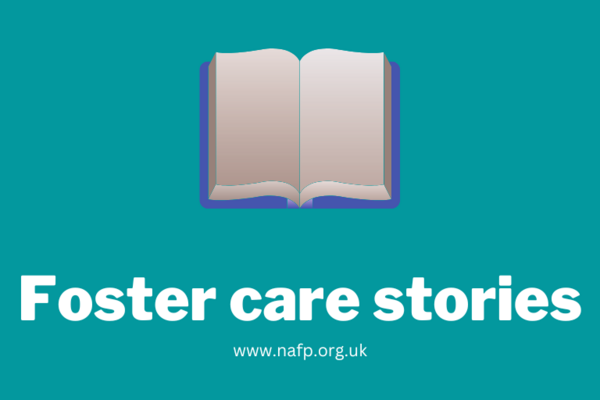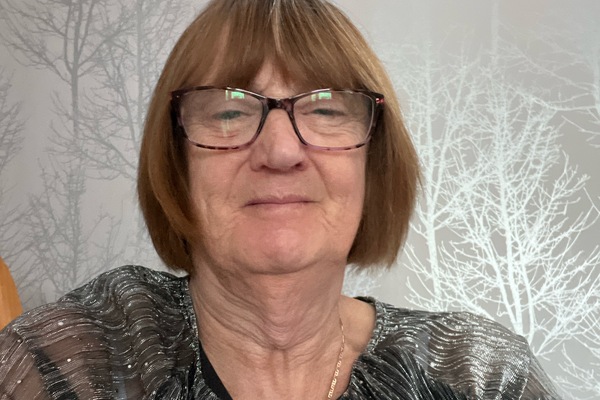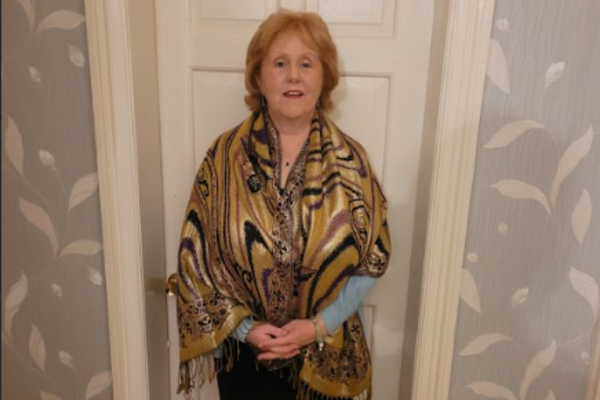What was it about fostering that made you want to get involved?
I trained to become a teacher, I had four children myself, and I've always been one of those people who likes to look out for others. When my daughter had her first child I went to visit her in the hospital. There was a young girl in the bed opposite, but she'd lost her Mum and she didn't really know what to do with this baby.
This really got me thinking and that particular night when I went home, I saw they were looking for Home Start volunteers in the paper. I decided to sign up for it, which meant I used to go into a young family's home, with a Mum who was having challenges either with the children or with her mental health. I did that for two years. I’ve always been one for taking people under my wing, but with four children and working full time it wasn’t the right time to become a foster carer. That changed when I split up with my husband and I’ve been fostering for six years now.
I was working full-time, but I realised I could manage it at weekends and I started off doing respite care. I loved it so much that I thought I’d try to give it a go full time. A teenage girl came to me for ten months: I was still working full time and the circumstances just weren’t right for either of us so I ended up going back to respite. I now have two young girls who come to me once a month at the weekend, so I have two weekends that are my own and two weekends that are taken up with fostering.
Respite* care is very important, but it doesn’t get spoken about as much as some of the other caring or social roles within the sector. What are the benefits of respite care and why does it work really well for you?
My fostering agency, Newfocas, is very supportive and they include respite carers in all the training and activities that goes on. I think being a respite carer gives you the ideal choice. I’ve had girls and boys staying with me, from a range of different age groups and personalities. I feel that if I was a full-time carer I would only be with one or two children, but being a respite carer means I've been able to support so many different children.
When the children come to me, I try to let them choose what they want to do to a certain extent. One of the young girls that comes now just wants to chill, and the other wants to be on the go all time. She’s got to be doing things, and she’s full of so much energy and questions about where we’re going and what we’re going to be doing. The other one often says she doesn’t want to do anything, but we’ll walk to the shops to get out and about. I don’t want to push them into something that they don’t want to do, because when they come on respite it’s not just about doing things all the time.
A young lad used to come to me for a couple of years, and he would always bring his guitar. I started to learn the guitar too and we played together. He came out of the fostering system about two years ago, but I bumped into him two months ago and he said, “remember when you used to play your guitar and I used to play mine.” It’s just nice to know that they've got those memories despite the trauma that they’ve been through. I feel privileged to be a respite carer and getting to meet and help so many young people.
How did you manage to balance working full time with being a full time foster carer?
When I look at it now, I sometimes wonder how on Earth I did it because it was tough. The teenager I had full time came to me the week before Christmas and she’d just been split from her twin sister, which was very tough for her. I was teaching in a primary school, which is not just a nine-to-three job. She just wanted to be back with her sister and made things really challenging for me and my family. It got to a point where I had to make the difficult decision that I couldn’t look after her anymore. I needed to put myself first. If I hadn’t I’d have probably left fostering. It was a really hard decision. I'd had this young girl for ten months and she was really starting to flourish. You could see the difference from when she first came to me, but for the sake of myself and my family I had to go back to respite.
Fostering, as you mention, comes with tough times. How do you cope with these and make sure you look after yourself?
The fostering support team at my agency is, for the main part, there for me. I also think that having time out for yourself and looking after yourself is important. When the children go on respite, make sure that you do something that you enjoy or is meaningful to you to get through the tough bits. If you don't have that respite yourself it can drag you down and be quite awful. Family really helps too: I've got four children and they all support me in everything I do. They were there for me during times when I was upset and helped me when things were really tough. I think you've got to reach out for that help, because if you don't you start to drown in everything that's thrown at you.
This is great advice because it can be hard to stay motivated and stick at it when you go through a challenging patch. Let’s switch onto a more positive track: what is your favourite part about being a foster carer?
I love spending time with the children, and I love watching them grow. One of the young girls I currently look after has been coming to me for four years. In that time she's had four sets of foster parents and I've been one of the few bits of stability in her life, along with her social workers. When she came to me it could be pretty dire at times, but watching her grow and flourish into a young lady with so many wonderful positives makes you realise that you are giving them something. If I can help them in any sort of way and make their life slightly better than what it's been in the past, then I feel as if I'm doing the job that I'm supposed to do.
Looking back, what was the one thing you wish you’d have known when you first went into fostering?
It’s an emotional rollercoaster. People often ask me, does it upset you when you have a foster child and then never see them again? I think you've got to have a wall in between yourself and the foster child. I had a young girl this year. The police brought her to my door at midnight and she was with me for three days. I haven't seen her since and I probably won't see her again. You can't get attached to them as much as you might like to. You've got to keep that barrier between yourself and the foster child, because otherwise you would get so attached to them and be upset every time that they went off or moved.
The young girl I foster now has had four sets of foster parents in as many years. She could get another set of foster parents tomorrow who might live in Scotland and I won't see her again. But, she's been coming to me for four years and I'm grateful for that time that we’ve spent together. We do lovely things: we bake, and watch films, and we laugh, and we go to the park. We went to the zoo and got ice cream and do all the stuff you would do as a family, but you've still got to put those boundaries in places too.
What would you consider like your biggest success or breakthrough with the young people you've worked with?
I used to have a teenage boy that came to me. He was thirteen and he was a bit challenging when he came here and a bit of a handful for his foster parents too. One day I got a phone call: the foster parents said that the relationship had broken down with this young boy and could he move in with me? It was quite short notice, but he stayed for about four or five weeks. In that time, the foster parents realised that they wanted him back and they built the relationship back up. If he hadn't had me as a respite carer he'd have probably have gone to another foster parent and the original foster parents would've lost out.
You said that the right time for you to become a foster carer was after you got divorced. It’s great that fostering works for many different situations other than the stereotypical nuclear family. How do you find fostering as a sole parent, and do you have any advice for others?
Fostering as a couple has its benefits because if there's two in the house and you wanted to nip out to the shop then you’ve got that support. When you are a single parent, you are wholly responsible for that child. It’s all down to you and you don’t get to share those responsibilities. However, I don't think the children lose out on not having two parents, because if they did then they wouldn't keep coming back to me. There are pros and cons with everything, but I chose to do it on my own and I've never really needed support in the role itself.
With thanks to Newfocas
* Note: there are mixed views about use of the term 'respite' (see NAFP's 'Language in fostering' briefing')









